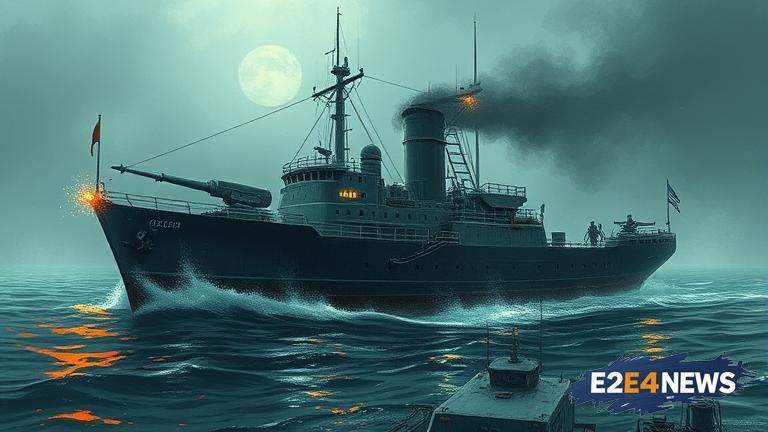A mysterious ghost ship was recently discovered in the port of Astakos, Greece, sparking widespread concern and intrigue. The ship, which was found to be carrying a large quantity of military equipment, has been linked to Libyan warlord Khalifa Haftar. According to reports, the ship was transporting arms and ammunition intended for Haftar’s forces, which have been embroiled in a long-standing conflict in Libya. The discovery of the ghost ship has raised serious questions about international arms trafficking and the potential for illicit weapons to fall into the wrong hands. The Greek authorities have launched an investigation into the matter, with officials working to determine the origin of the ship and its cargo. The ship’s discovery has also sparked concerns about the potential for terrorist organizations to acquire military equipment. The international community has been quick to condemn the alleged arms trafficking, with many calling for increased transparency and cooperation to prevent such incidents in the future. The United Nations has also issued a statement expressing concern about the situation and urging all parties to comply with international law. The ghost ship’s discovery has also highlighted the need for increased security measures in ports and shipping lanes to prevent the transportation of illicit goods. The incident has sparked a heated debate about the role of international powers in fueling conflicts in regions such as Libya. Many have criticized the actions of countries such as the United Arab Emirates and Egypt, which have been accused of providing military support to Haftar’s forces. The situation has also raised concerns about the potential for the conflict in Libya to escalate, with many fearing that the introduction of new weapons and equipment could lead to further violence. The Greek government has pledged to take all necessary steps to prevent the transportation of illicit goods through its ports, and has called on the international community to work together to address the issue. The discovery of the ghost ship has also sparked concerns about the potential for corruption and organized crime to be involved in the arms trafficking. The investigation into the matter is ongoing, with officials working to determine the extent of the arms trafficking and to identify those responsible. The incident has highlighted the need for increased cooperation and transparency in the international community, particularly when it comes to the transportation of military equipment. The situation has also raised concerns about the potential for the conflict in Libya to have far-reaching consequences, with many fearing that it could lead to a wider regional conflict. The international community has been urged to take a strong stance against arms trafficking and to work together to prevent the proliferation of illicit weapons. The discovery of the ghost ship has also sparked concerns about the potential for terrorist organizations to acquire military equipment, with many calling for increased security measures to be put in place. The incident has highlighted the need for increased vigilance and cooperation to prevent the transportation of illicit goods, and to address the root causes of conflicts such as the one in Libya. The situation has also raised concerns about the potential for the international community to be complicit in arms trafficking, either intentionally or unintentionally. The Greek authorities have pledged to do everything in their power to prevent the transportation of illicit goods through their ports, and to work with the international community to address the issue. The discovery of the ghost ship has also sparked concerns about the potential for the conflict in Libya to be fueled by external powers, with many calling for increased transparency and cooperation to prevent such incidents in the future.





